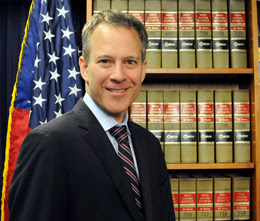
Attorney General Schneiderman’s announcement follows a Call to Action on Non-Compete Agreements issued Tuesday by the White House as part of the President’s initiative to increase economic competition. While growing numbers of states have moved to curtail the misuse of non-competes in recent years, A.G. Schneiderman’s bill marks the most comprehensive proposal yet to protect workers from these harmful constraints. The proposal includes a ban on all non-competes for low-wage workers; a requirement that employers offer extra compensation to employees who sign non-competes; and a first-of-its-kind provision granting employees the right to seek liquidated damages when subjected to unlawful non-competes.
“Workers should be able to get a new job and improve their lives without being afraid of being sued by their current or former employer,” said Attorney General Schneiderman. “My proposed bill will protect workers’ rights to seek new and better opportunities, particularly low-wage workers who have been locked into minimum wage jobs due to non-competes. It will also ensure that businesses can hire the best worker for the job.”
A.G. Schneiderman’s proposal builds on a string of settlements earlier this year that banned non-competes at companies including the fast-food chain Jimmy John’s, the legal news site Law360, and the medical services company EMSI. Additional investigations by the A.G’s office are ongoing.
A.G. Schneiderman’s proposed bill:
- Prohibits the use of non-competes for any employee below the salary threshold set by Labor Law Section 190(7), currently $900 per week;
- Prohibits non-compete agreements that are broader than needed to protect the employer’s trade secrets or confidential information;
- Requires non-compete agreements to be provided to employees before a job offer is extended;
- Requires employers to pay employees additional consideration (money) if they sign non-compete agreements;
- Limits the permissible time duration for non-compete agreements; and
- Creates a private right of action with remedies including liquidated damages for violations.
Non-compete agreements present particular challenges for low-wage and rank-and-file workers, who are increasingly subject to these restrictions. Such workers may be deterred by non-compete agreements from seeking new employment, but may never have the opportunity to meaningfully negotiate such agreements and may lack the means to challenge a non-compete agreement in court.
A March 2016 report published by the U.S. Treasury Department found that non-compete agreements cause various harms to “worker welfare, job mobility, business dynamics, and economic growth more generally.” A May 2016 report published by the White House concluded that non-compete agreements also depress wages and inhibit innovation. Some states have taken action to combat such agreements: California and Oregon have laws prohibiting non-compete agreements altogether or sharply limiting their use, and Massachusetts and other states have similar bills pending. Federal lawmakers are also concerned about the severe and unfair restrictions such agreements place on the lowest-paid workers.
Employees who believe they are subject to an unlawful non-compete agreement are encouraged to contact the New York Attorney General’s office at 212-416-8700 or noncompete@ag.NY.gov with questions or concerns.

